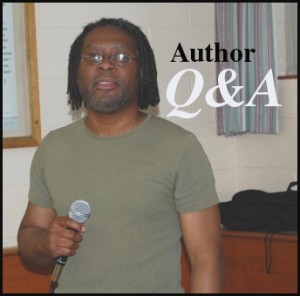THE JIGSAW MAN CAN: A CONVERSATION WITH MARVIN BROWN
By Frank Esposito

Marvin Brown, ready to take questions … (Credit: Melinda Brown)
“Highway to Hell” is one of AC/DC’s greatest songs. It’s also an apt description of the literary career of one Marvin Brown of Akron, Ohio.
Eleven years after the appearance of Covet, his debut novel, Brown is back with Jigsaw Man (2012), another dark, twisted thriller. Like Covet, Jigsaw Man will leave readers wondering what that sound was they just heard from the basement—and wondering why the light in the upstairs hallway is off when they swore they just put it on five minutes ago.
Marvin recently took some time away from watching TV dramas about serial killers to provide some insight into his creative process:
Q: What should people expect when they open the pages of Jigsaw Man?
Marvin Brown: A twisting of expectations. I set the stage for a revenge tale and then go about twisting and subverting the traditional tropes of such a tale. I mean, there’s a victim, but we later learn that person’s not as much of a victim as we wanted to believe. A character who seems most likely to crack under pressure emerges as a well-adjusted steadying force. Another who seems poised to be the hero makes unheroic decisions, and comes undone in the grip of the consequences of those decisions.
Even the villain of the book isn’t on a cut-and-dry mission of destruction and is subject to fears and human failings. Jigsaw Man’s written to keep defying the reader’s expectations in hopes that they’ll just give up trying to predict plot turns or character behavior and surrender to the story. I mean, there’s fun in beating a good suspense book at its own game, but tales of suspense often work better when the reader can’t figure out what’s coming around the corner.
Q: Did you approach this book differently than you did your first book, Covet?
MB: Covet stretches across the life of the main character and details the sad trajectory of his life, but is ultimately a story told through one perspective. Jigsaw Man has eight or more characters and multiple perspectives. The canvas here is larger, obviously, and so my approach required mounds more research and more work on building the players in the game: different speech patterns, different core beliefs, etc. Covet is a novella, basically, and I could hold all of it in my hands, so to speak, as I constructed it. Jigsaw Man required a longer journey to the light at the end. I constructed it in segments.
Q: Your life situation changed from being single when you wrote Covet to being a family man when you wrote Jigsaw Man. How did that affect your writing process?
MB: From a standpoint of time, writing now requires time management I hardly considered when I was single. My wife and kids and my responsibilities to them are factors now. I used to be up at all hours writing. Today, I literally struggle to stay up past 11 p.m., so now I have to make time for writing!
From a creative standpoint, being a family man probably would have informed Covet, since a central relationship in that book is between a father and his daughter. I didn’t have a daughter when I wrote it; now I have two. Re-reading pieces of Covet recently, I think it holds together.
I’d say I guessed well in writing Covet, but I wonder if a do-over would have had me tapping into more of the extremes that exist in parenting. I mean, kids touch you to the depths of your soul and a day later push you into hair-pulling, heart-attack territory. It’s crazier than fiction. Marriage exposed in me strengths and weaknesses I might never have known otherwise. I draw on that when creating characters in committed relationships.
Q: Two of your favorite creators are Stephen King and Alfred Hitchcock. Are there elements of their work that turn up in your writing? If so, is that a deliberate thing or does it just happen naturally?

Alfred Hitchcock (Studio publicity photo)
MB: Stephen King, of course, is renowned for his ability to evoke terror in the most mundane of situations — some times out of thin air, even. Good horror writers can do that, though. But I consistently like Mr. King’s skill at molding characters — and weaving pop culture into their lives — that feels so familiar. That’s my high school experience. That’s how I feel when a boss tears into me. That’s my one good friend who stands with me in the dark. In fact, I think Mr. King’s uncanny ability to frighten likely stems from his skills at creating characters we care about, or at least are fascinated by enough to follow through these macabre situations.

Stephen King
Mr. Hitchcock’s the all-around champion at suspense, using texture, tone, pacing, visual dexterity, sound. Anything I can glean from him I’ll use in a second. If you think about it, plot-wise, he’s often using similar scenarios over and over in his films—the innocent man framed for a crime, the good-guy neighbor who’s secretly a killer. It’s his method of telling the story that gets you. Look at how many variations that guy’s tapped on basically the same plots. That’s why directors who are best at evoking his power are not the ones trying to dazzle with elaborate plot twists, but the ones who find in those plots moments that quicken the heart, moments that capture us with mood or pace.
So these are deliberate lessons I take from them—King and Hitchcock—when crafting a story: character, the use of tone, pacing, texture. I’ve seen every thing Hitchcock’s directed and I’ve read much of King’s work. So aside from deliberate efforts, I don’t doubt some of their influences bubble up from my subconscious mind.
Q: If the main characters from Jigsaw Man got into a brawl with their counterparts in Covet, who would win?
MB: Ha! Marka (from Jigsaw Man) would make quick work of Russell (from Covet), but Russell wouldn’t much care, which would take the fun out of it for Marka. Why’d I even answer that question, Frank?
End Note: Probably because it’s a classic comic book question (a la Superman vs. the Hulk) and Marvin’s a big Spider-Man fan as well …
Jigsaw Man is now available in several formats. It’s like a stress test without the electrodes. Enjoy!

| Frank Esposito is a senior reporter for Plastics News and a 1992 graduate of Bowling Green State University.
<News
| Home |






Nice job Frank!